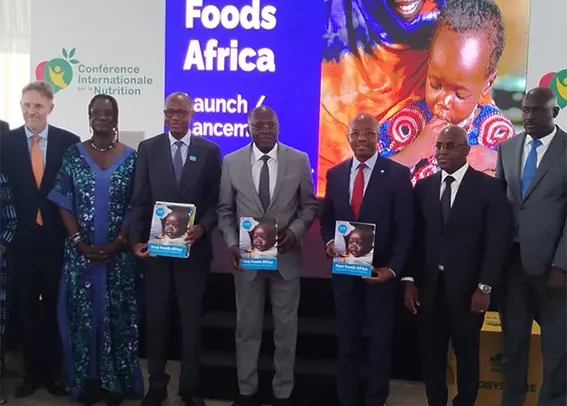Some dignitaries with the document
The United Nations Children’s Fund (UNICEF), in collaboration with the African Union Commission (AUC) and the Government of Benin, has launched the First Foods Africa Initiative, a continental effort aimed at tackling child food poverty and malnutrition through nutrition-sensitive food systems.
The programme was unveiled at a high-level event in Cotonou on Monday, September 29, with regional leaders, policymakers, and civil society groups in attendance.
Director of Health and Humanitarian Affairs at the AUC, Prof. Julio Rakotonirina, described the launch as a step towards eradicating child malnutrition and building resilient food systems across the continent.
“Nutrition is a right for every child, regardless of their geographic or economic background. Investing in children’s first foods means investing in Africa’s greatest wealth — its people,” he added.
Globally, one in four children under five (around 181 million) suffer from severe food poverty, according to UNICEF. Sub-Saharan Africa accounts for nearly a third of these cases, with 57 million children affected. Many survive on just breastmilk and a starchy staple, diets that leave them dangerously short of essential nutrients.
Although Africa has made progress in reducing stunting rates from 41.5% in 2000 to 32.3% today, population growth has increased the total number of stunted children from 55 million to over 62 million. More than 11 million children across the continent also suffer from wasting, a condition linked to acute malnutrition.
UNICEF officials argue that traditional food security efforts often prioritise staple crops and yields while neglecting the specific nutritional needs of infants and young children.
The First Foods Africa strategy seeks to close that gap through three main pillars; by encouraging local production of safe, affordable, and nutrient-rich foods for children under five; strengthening policies that guarantee children’s access to those foods; and promoting healthy diets through social marketing, behaviour change programmes, and community engagement.
The initiative will roll out in 14 priority countries across West, Central, East, and Southern Africa. It will be supported by governments, African food companies, and international partners such as Food and Agriculture Organisation (FAO), World Food Programme (WFP), World Health Organisation (WHO), and the World Bank.
To finance the programme, UNICEF is setting up a Child Nutrition Fund (CNF) to channel investments, de-risk private sector involvement, and provide technical support.
Speaking at the launch, UNICEF Deputy Executive Director Omar Abdi called the initiative “a transformative moment for Africa’s children.”
Benin’s Minister of State for Government Action Coordination, Abdoulaye Bio Tchane, reaffirmed his country’s support: “Benin reaffirms its commitment today to champion child nutrition. It is essential to building a resilient continent.”
Civil society and private sector representatives at the event also expressed strong backing for reshaping food systems to meet children’s needs.
If successful, First Foods Africa could significantly reduce malnutrition rates and ensure millions of African children gain access to healthier diets. UNICEF says the initiative is central to achieving the 2030 Sustainable Development Goals and the AU’s Agenda 2063.
By addressing the root causes of food poverty, UNICEF and its partners hope to secure a healthier, more prosperous future for Africa’s youngest citizens.
By Vera Owusu Sarpong


